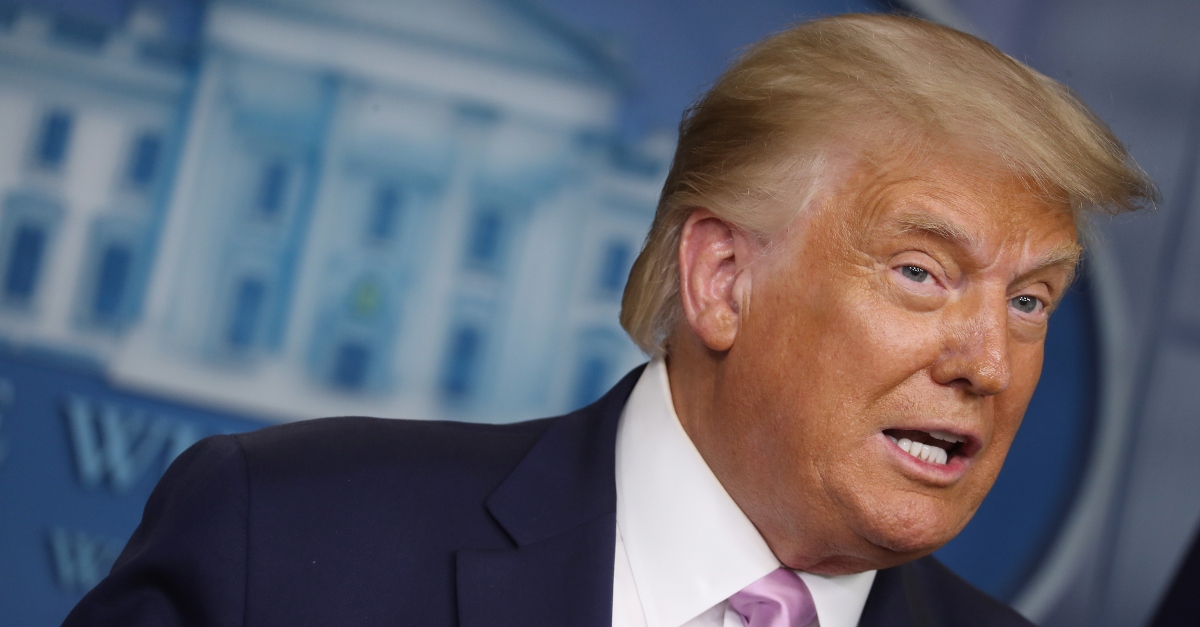
Donald Trump
Some members of the Trump administration reportedly say they are proud of violating the Hatch Act, which bars federal employees (except the president and vice president) from partisan political activities while on the job. This comes as the Republican National Convention is set to begin Monday, and the GOP are using White House property.
From The New York Times (emphasis ours):
The president is set to accept his party’s nomination on Thursday from the White House, with fireworks above the South Lawn. The first lady, Melania Trump, will speak on Tuesday from the Rose Garden, and Vice President Mike Pence will appear on Wednesday from Fort McHenry in Maryland, the site of a battle in the War of 1812 that inspired “The Star-Spangled Banner.”
All of the sites are controlled by the federal government, which some ethics experts say would violate the Hatch Act, a Depression-era law that bans the use of public spaces for political activities. Trump aides said that the White House venues being used are considered part of the residence, and therefore are authorized for political use. Some of Mr. Trump’s aides privately scoff at the Hatch Act and say they take pride in violating its regulations.
Professor Kathleen Clark, an expert of government ethics at Washington University in St. Louis School of Law, told Law&Crime that in past administrations, there have been high-level officials who violated the Hatch Act, but they apologized and took responsibility for those actions. High-level administration officials under President Donald Trump have repeatedly violated it, and “and other ethics laws that prohibit the abuse of government power for private gain,” she said.
“President Trump has refused to punish or even admonish high-level officials who violated the law in ways that have benefited him or his family,” she said. “President Trump punishes officials who abide by ethics rules and refuse to use government power to improperly benefit him (e.g., AG Jeff Sessions), and refuses to punish those who violate ethics rules to improperly benefit him (e.g., Conway).”
Fired Attorney General Jeff Sessions famously stoked the president’s resentment after recusing from the Russia investigation. On the other hand, Counselor to the President Kellyanne Conway, one of Trump most staunch defenders in the media, still has her job even after the Office of Special Counsel determined she repeatedly violated the Hatch Act and they recommended she lose her position. She “violated the Hatch Act on numerous occasions by disparaging Democratic presidential candidates while speaking in her official capacity during television interviews and on social media,” they wrote in a June 2019 press release.
The bottom line of the law is that federal employees shouldn’t be using federal power to affect a partisan political election, including a reelection, Clark told Law&crime.
One provision is that federal employees cannot participate in partisan political activity while in a room or building in which federal employees do their business. This has been interpreted as not reaching the personal quarters of the president. But a Hatch Act violation could occur, for example, if federal authority were invoked on the South Lawn to affect the election. If federal employees were in involved in the managing of that endeavor, then this may violate a provision, including a criminal one, Clark said.
“If President Trump serves a second term, we can anticipate that his administration will double down on violating laws (such as the Hatch Act) intended to protect the public trust,” she said.
We asked Clark what the Trump administration’s behavior revealed about weaknesses in the statue. She said the law is insufficient if we have an administration committed to violating and ignoring it.
“That’s basically what we have with the Trump administration,” she said. Clark pointed out we also rely on the United States Merit Systems Protection Board, and the Department of Justice. We have reason to believe the DOJ will not enforce the law against Trump and his officials, however, she said. The record demonstrates our vulnerability in the face of an administration that is not committed to the law, she said.
“We were relying on the good faith of the government to apply and comply with the law,” she said. Our mechanisms for accountability were failing, she said.
Matt Naham contributed to this report.
[Image via Chip Somodevilla/Getty Images]